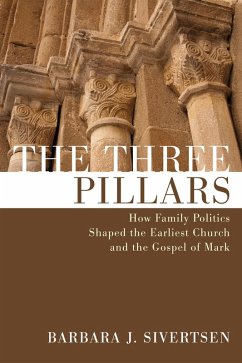
The Three Pillars (eBook, ePUB)
How Family Politics Shaped the Earliest Church and the Gospel of Mark
Versandkostenfrei!
Sofort per Download lieferbar
11,95 €
inkl. MwSt.
Weitere Ausgaben:

PAYBACK Punkte
6 °P sammeln!
The Three Pillars: How Family Politics Shaped the Earliest Church and the Gospel of Mark, examines how family relationships played a key role in the earliest Christian church. By disentangling the two disparate genealogies of Jesus, the author reconstructs the families of Joseph and Mary. Presented here for the first time is the full ancestry of Jesus' mother, Mary, who was descended from the anti-Hasmonean high priest Alcimus. The author suggests that Mary and her daughter Mary played a hitherto unrecognized role in the church's earliest leadership struggle and that a composite of these two w...
The Three Pillars: How Family Politics Shaped the Earliest Church and the Gospel of Mark, examines how family relationships played a key role in the earliest Christian church. By disentangling the two disparate genealogies of Jesus, the author reconstructs the families of Joseph and Mary. Presented here for the first time is the full ancestry of Jesus' mother, Mary, who was descended from the anti-Hasmonean high priest Alcimus. The author suggests that Mary and her daughter Mary played a hitherto unrecognized role in the church's earliest leadership struggle and that a composite of these two women, not Mary Magdalene, was the basis for the Gnostic Mary of later Christian works. The author next explores how this early leadership conflict shaped the Gospel of Mark, which she argues was written by Peter's son. She discusses Mark's footprint in this Gospel and how Mark's resentment of the relatives of Jesus, his ambivalence toward his father, and his anger at the disciples for ceding leadership to these relatives is at the heart of some of the most distinctive features of the Second Gospel, features that have perplexed biblical scholars and laymen for centuries. The last section examines the mysterious Beloved Disciple in the Gospel of John. The author concludes that the many unlikely elements in the account of the arrest and interrogation of Jesus can only be explained by seeing the Beloved Disciple as a close relative of the high priest Caiaphas and that this family relationship was crucial to the protection of the early Christians in Jerusalem. The book's final chapter offers reflections on how kinship played an important role in Jesus' ministry and how the high priestly-leadership responded to him in part because of his family lineage.
Dieser Download kann aus rechtlichen Gründen nur mit Rechnungsadresse in A, D ausgeliefert werden.



